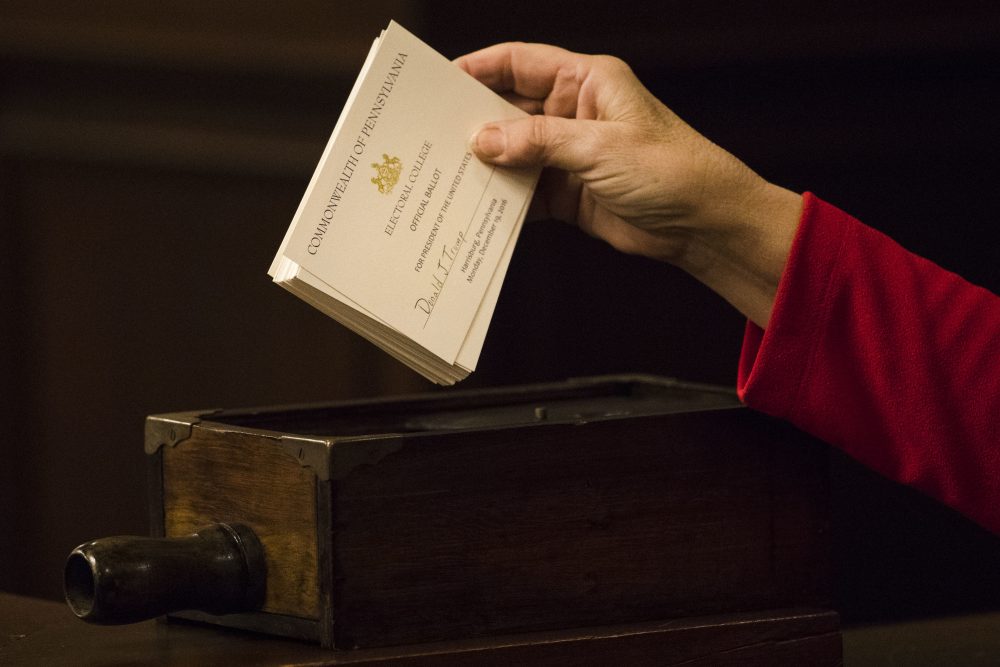Advertisement
The Electoral College Was Born In Racism. Let’s Drop Out

COMMENTARY
New Year’s resolutions can be defined as worthy goals that you promise to achieve — and then don’t. In that spirit, as we prepare to welcome 2017, let’s resolve to shed a piece of flab from the body politic, even though this diet, like so many others, probably will be abandoned: We should abolish the Electoral College.
It’s not just an affront to majority rule, though it’s certainly that. Before 2000, we hadn’t elected a president who lost the popular vote in more than a century. With Donald Trump, we’ve lived to see two such victors in just 16 years. But I wonder how many people realize another troubling fact about the Electoral College — this 18th century artifact was incubated in a crime against humanity. It was invented in part to coddle slave-holding southern states.
In Black Lives Matter America, doing away with the undemocratic relic would make a small statement for equality as well.
I wonder how many people realize another troubling fact about the Electoral College -- this 18th century artifact was incubated in a crime against humanity.
As an admirer of the founders’ genius, I appreciate the bind facing them in 1787, when they gathered in Philadelphia to stitch a Constitution from the fraying threads of unity between the states. A convention proposal for popular election of the president couldn’t hurdle southern objections, summarized by James Madison from slave-holding Virginia. “The right of suffrage,” he said, “was much more diffusive in the Northern than the Southern States; and the latter could have no influence in the election on the score of Negroes.”
“In other words,” Yale constitutional law scholar Akhil Reed Amar explains, “in a direct election system, the North would outnumber the South, whose many slaves (more than half a million in all) of course could not vote.” Madison proposed an early version of the Electoral College, which threaded the needle between democracy and racism by letting the slavocracy count each African American in chains as three-fifths of a person.
Virginia “emerged as the big winner — the California of the Founding era — with 12 out of a total of 91 electoral votes allocated by the Philadelphia Constitution, more than a quarter of the 46 needed to win an election in the first round,” Amar writes. “After the 1800 census, [the] free state of Pennsylvania had 10 percent more free persons than Virginia, but got 20 percent fewer electoral votes.”
Advertisement
Slavery, and its rendering black people as fractions, ended, but the Electoral College lingers, its defenders ignoring its racially tinged history while recycling the old argument that popular election would hand president-picking to populous, often Democratic states at the expense of the heartland. (Each state’s electors equal its number of senators and House members, the latter, of course, being based on population.) “Ditching Electoral College would allow California to impose imperial rule on a colonial America,” one conservative publication headlined.
The rejoinder is obvious: The current system allows a minority of voters to impose imperial rule on the majority. Who’s playing Caesar here? It’s true that the will of the presidential majority has been trampled only a few times in our history, but it shouldn’t be possible for it to happen at all. Remember, too, that small states’ interests are protected by the architecture of the U.S. Senate, where each state, from California (the biggest in population) to Wyoming (the tiniest), gets two senators.
Slavery, and its rendering black people as fractions, ended, but the Electoral College lingers...
I’m on record that the Electoral College this year handed power to a man I consider unfit, and his acolytes and their elected representatives will dismiss calls to abolish the college as losers’ sour grapes, even though Trump himself once condemned it. The fact that a majority of Americans wants a majority of Americans to elect presidents probably won’t change minds, either.
So a constitutional amendment to get rid of the damn thing is off the table. But there’s another route. Ten states and the District of Columbia have enacted laws requiring their electors to support the popular vote winner nationally. Those laws will take effect whenever enough states with a majority of electoral votes (270) sign on to the deal. The 10 and D.C. possess 165 votes.
Some hope citizen activists will propel that process forward. It’s a consummation devoutly to be wished, but calls to change the system after George Bush lost the popular vote in 2000 went nowhere. Now, as then, pressing domestic and foreign problems may relegate election reform to the back burner. While I hereby resolve to support the Electoral College’s demise, the realization of that goal, for the foreseeable future, likely will go the way of my resolutions to be less impatient.
Ask my wife how those worked out.
